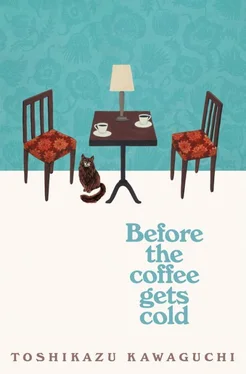Kohtake was in two minds about drinking, but was reluctant to pass up the chance. ‘Well, just one…’ she said.
Kohtake was simply thankful that the mood had changed. She had heard that Kei often acted on impulse, but she had never expected to experience her sense of fun at a moment like this.
Hirai had often mentioned Kei’s talent for living happily ; she may have looked despondent a few moments earlier, but now she was looking at Kohtake with wide, bright eyes. Kohtake found staring into those eyes a strangely calming experience.
‘I’ll see if I can find some nibbles to go with it,’ Kazu said, disappearing into the kitchen.
‘Why don’t we warm the sake?’
‘No, it’s OK.’
‘Right, we’ll drink it as it is.’
Kei removed the lid deftly and poured the sake into the row of glasses she had set out.
Kohtake let out a chuckle as Kei placed a glass in front of her. ‘Thank you,’ she said with a thin smile.
Kazu returned with a tin of pickles. ‘This was all I could find…’ She put down a small dish, tipped the pickles onto it and set three small forks on the counter.
‘Oh, yum!’ Kei said. ‘But I can’t drink myself.’ She brought out a carton of orange juice from the fridge under the counter and poured herself a glass.
None of the three women were that particular about sake, especially Kei, who didn’t drink. Seven Happinesses earned its name from the claim that those who drank it would obtain seven different kinds of happiness. It was transparent, pigment-free top-shelf sake. The two drinkers did not take much notice of this premium sake’s subtle glacial hue – nor its fruity aroma. But it went down well and delivered on the happy feeling its label promised.
As Kohtake inhaled the sweet aroma, she recalled one summer day, some fifteen years ago, when she first visited the cafe.
There had been a heat wave in Japan that summer. Record temperatures were continually reported throughout the country. Day after day, the television discussed the unusual weather, often alluding to global warming. Fusagi had taken a day off from work, and they had gone shopping together. That day was a real scorcher. Hot and bothered from the heat, Fusagi pleaded that they take refuge somewhere cool, and together they searched for a suitable place, like a cafe. The problem was that everyone had the same idea. None of the cafes or family restaurants they spotted had empty seats.
By chance, they saw a small sign in a narrow back alley. The cafe’s name was Funiculi Funicula. It was the same name as a song Kohtake once knew. It was a long time since she’d heard it, but she still remembered the melody clearly. The lyrics were about climbing a volcano. The thought of red-hot lava on this hot summer day made everything seem even hotter and jewel-like beads of sweat formed on Kohtake’s brow. However, when they opened the heavy wooden door and entered, the cafe was refreshingly cool. The clang-dong of the bell was also comforting. And, even though it had three two-seater tables and a three-seater counter, the only customer there was a woman in a white dress seated furthest from the entrance. Thanks to a stroke of luck, they had made a real find.
‘What a relief,’ Fusagi said and chose the table closest to the entrance. He quickly ordered iced coffee from the woman with the bright eyes who brought them glasses of cold water. ‘Iced coffee for me too, please,’ Kohtake said, sitting opposite him. Fusagi must have been uncomfortable with this seating arrangement, as he moved and sat at the counter. This didn’t upset Kohtake: she was used to such behaviour from him. She was just thinking how wonderful it was to find such a relaxing cafe so close to the hospital where she worked.
The thick pillars and the massive wooden beam that cut across the ceiling were a lustrous dark brown, like the colour of chestnuts. Mounted on the walls were three large wall clocks. Kohtake didn’t know much about antiques but she could tell that these were from an earlier period. The walls were tan, made of earthen plaster with a wonderful patina of obscure stains that had obviously built up over many years. It was daytime outside, but in this windowless cafe, there was no sense of time. Dim lighting gave the cafe a sepia hue. All this created a comforting, retro atmosphere.
It had been incredibly cool in the cafe, but there was no sign of an air conditioner. A wooden-bladed fan fixed to the ceiling was slowly rotating, but that was all. Thinking how strange it was that this cafe was so cool, Kohtake asked both Kei and Nagare about it. Neither provided satisfactory answers; they just said, ‘It’s been like this since long ago.’
Kohtake took a real shine to the atmosphere, and to the personalities of Kei and the others. And so she began to come often during her breaks from work.
‘Chee—’ Kazu was going to say Cheers but stopped herself, screwing up her face as if she had committed a faux pas.
‘I guess it’s not a celebration, is it?’
‘Oh, come on. Let’s not be too down,’ Kei said glumly. She turned to Kohtake and smiled sympathetically.
Kohtake held up her glass in front of Kazu’s. ‘I’m sorry.’
‘No, it’s fine.’
Kohtake smiled reassuringly and clinked glasses with her. This harmonious clink – unexpected and cheerful – sounded throughout the room. Kohtake took a sip of Seven Happinesses. Its gentle sweetness spread through her mouth. ‘It’s been half a year since he started calling me by my maiden name…’ she began, speaking softly. ‘It’s silently progressing. Fading away, slowly but steadily fading away… His memory of me, that is.’ She laughed softly. ‘I have been mentally preparing for this, you know,’ she said.
As Kei listened, her eyes were again slowly reddening.
‘But it’s really OK… honestly,’ Kohtake hastened to add, waving her hand reassuringly. ‘Hey guys, I’m a nurse. Look, even if my identity is totally erased from his memory, I’ll be part of his life as a nurse. I’ll still be there for him.’
Kohtake had put on her most confident voice to reassure Kei and Kazu. She meant what she said. She was putting on a brave face, but her bravery was real. I can still be there for him because I’m a nurse.
Kazu was playing with her glass, staring at it with a deadpan expression.
Kei’s eyes welled up again and a single teardrop fell.
Flap.
The sound came from behind Kohtake. The woman in the dress had closed her book.
Kohtake turned round to see the woman in the dress placing the closed novel on the table. She took a handkerchief from her white purse, rose from the table and headed towards the toilet. The woman in the dress walked silently. Had they not heard the novel close, they might never even have noticed she had gone.
Kohtake’s eyes stayed glued to her movements, but Kei just glanced at her, and Kazu took a sip of Seven Happinesses and didn’t even look up. After all, it was just an ordinary daily occurrence for them.
‘That reminds me. I wonder why Fusagi wants to return to the past?’ Kohtake said, staring at the seat vacated by the woman in the dress. She knew, of course, that that was the seat for returning to the past.
Before the Alzheimer’s disease took hold, Fusagi was not the type of person who believed in such tales. When Kohtake casually mentioned the rumour that this cafe could send you back to the past, he would scoff. He didn’t believe in ghosts or the paranormal.
But after he started to lose his memory, the once-sceptical Fusagi started coming to the cafe and waiting for the woman in the dress to leave her seat. When Kohtake first heard of this, she found it hard to believe. But personality change is one of the symptoms of Alzheimer’s, and now that the disease had progressed, Fusagi had newly become very absent-minded. In light of such changes, Kohtake had decided that it wasn’t particularly strange that he had changed what he believed in.
Читать дальше













